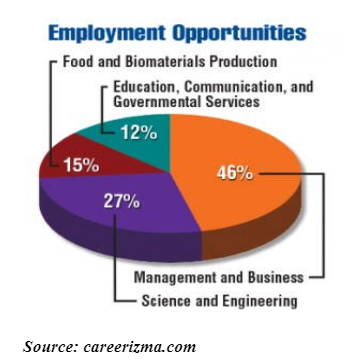The Career Opportunities with an MSc in Agriculture Program

Table of Contents
Introduction
An MSc degree, as we all know, provides you with advanced knowledge in a certain topic. However, in the modern world, with the Indian agriculture sector having a worth of about USD 435.9 billion, and anticipating further growth in the future, an MSc in Agriculture can be very helpful. Moreover, this degree can help you brush up on your knowledge and abilities by providing you with amazing employment prospects down the road.
So, if you are interested in learning more about the fantastic career opportunities and many industries you can pursue with this degree, do keep reading this blog.
Master's of Science in Agriculture- Course Highlights
The focus of this postgraduate program is specifically on agricultural studies and the different scientific procedures connected to agriculture. However, there are a total of 12 disciplines available for this academic program, and some of the most well-liked concentrations are Agronomy, Biotechnology, Agricultural Economics & Farm Management, Plant Physiology, and Entomology.
Below is a quick description of this course as it is offered by MSc colleges:
| Duration of the course | 2 Years |
|---|---|
| Mode | Semester |
| Minimum Academic Requirement | Pass the B.Sc. in agriculture, horticulture, or an equivalent program with a minimum overall score of 50%. As per State Government regulations, there is, however, some relaxation for students in the reserved category. |
| Average Course Fee | Ranges between 1.5 LPA to 3 LPA |
Know About a Career in Agriculture
The landscape of agriculture as an industry has drastically changed over the past ten years, with support from government programs like "Atma Nirbhar Bharat" and "Make in India" as well as rising private sector investment. As a result, agricultural education in India has changed and adapted to meet the evolving requirements of society as a whole, and by coming up with innumerable career opportunities in multiple fields.
A breakdown of the key areas that provide career opportunities is shown in the pie chart below:

Some of the Sectors to Explore with an MSc in Agriculture
Horticulture
This has a wide scope on a national and international level, and the improvements in horticulture technology, rising consumer demand, and an expanding export business make it a lucrative job choice. However, plantations, vegetable farms, fruit groves, horticulture institutes, and plantations are some of the sectors where horticulturists might find employment.
Poultry Farming-
The egg and chicken farming sector in India has seen a 20% annual rise due to rising demand for an affordable source of nutrients high in protein. Also, various hatcheries, veterinary clinics, pharmaceutical enterprises, feed millers, and feed production businesses all have openings for sector workers.
Dairy Farming
This offers a wide range of job prospects in India as it is the world's largest producer of milk and the second-largest producer of milk products. Additionally, this field offers employment opportunities in both the public and private sectors. Furthermore, dairy farming managers and technologists now have a far wider range of work options in both production and marketing.
Forestry
Forests are a crucial component of an ecosystem, and therefore it becomes necessary for the forest to be managed, which is what forest experts do. Furthermore, earning a degree from the MSc top colleges in India opens up a variety of job opportunities, including those in zoos, wildlife refuges, the forest service, national parks and sanctuaries, and other establishments are included in this area.
Aquaculture
India is the fourth-largest fish producer in the world and offers significant opportunities for aquaculture and fishing due to its extensive coastline and rich biodiversity. However, there are several employment choices in this area in both the public and commercial sectors.
Sericulture
Sericulture is the deliberate mass-scale raising of silk-producing organisms to create silk. And, in terms of manufacturing all five types of silk—Mulberry, Eri, Muga, Tropical Tasar, and Temperate (Oak) Tasar—India holds the unique distinction of being the only nation to do so. Additionally, the MSc Agriculture colleges equip you with job options of sericulturist, sericulture researcher, assistant, inspector, supervisor, etc.
Also Read : Rise of Young Blood in Agriculture
Emerging Job Opportunities for MSc in Agriculture Degree Holders
| Job Profiles | Job Role |
|---|---|
| Forest Product Manager | In this profession, you will be in charge of managing a staff of workers who operate the mills, supplies, and machinery used in the manufacturing of forest products. |
| Agricultural Loan Officer | They assist farmers in raising the money required to maintain their businesses, buy new land, and perform other activities. Also, as an agriculture loan officer, you can help struggling farmers maintain their brands or grow their businesses. |
| Forest Ecosystem Manager | Working with cutting-edge technology, establishing sustainable methods for the preservation of woodlands and forests, and investigating soils, water, plants, and animals are all part of this position. |
| Financial Analyst | As a Financial Analyst, you will advise individuals and agribusinesses on important financial choices and investments. |
| Insect Biologist | They are also referred to as agricultural entomologists, who research insects, their habitats, and their behaviour to provide farmers with advice on how to safeguard their crops from damaging pests without eradicating helpful species like bees. |

Why Pick Mansarovar Global University for the Best Agriculture Courses?
The university has over 25 years of extensive expertise in creating educational institutions, and nevertheless, provides undergraduate, graduate, and diploma programs in agriculture. Additionally, it provides pupils with a relaxed learning environment that fosters innovation and critical thinking.
- It includes a well-built infrastructure and agricultural science laboratories with cutting-edge equipment.
- Theoretical, practical, professional, and technical training for a thriving career in agriculture is offered to students at Mansarovar Global University. And, also it employs competent instructors with extensive expertise in this area.
- This top private university in Bhopal offers excellent placement opportunities.
- Overall, the institute encourages students to be creative and to think critically
Also Read : Jobs After B.Sc. Agriculture
Final Thoughts
Summing up, due to developments in science and technology, the agriculture sector has grown phenomenally. Additionally, India has about 540 agriculture institutions that offer a wide variety of in-depth agriculture degrees. And, although undergraduate programs lay a strong conceptual foundation, getting an MSc in Agriculture is important to flourish in the field.
FAQs
What makes agriculture studies the best course in MSc?
The top characteristics that make an agricultural study the best course in MSc are a wide range of career options, employment stability, competitive salary, pleasant work culture and environment, better knowledge of the agriculture industry, etc
What are the biggest issues affecting agriculture?
The main issues in agriculture are typically the loss of arable land, erosion, and other elements that limit farmers' capacity to use land. However, inflation, governmental limitations, and many other issues are among the significant challenges facing agriculture. Moreover, obtaining a degree in agriculture better equips you with the challenges and solutions of this industry.
What crucial competencies must a graduate in agriculture possess?
The management of animals and crops, practical farming knowledge, organizational skills, technical/mechanical skills, interpersonal/communication skills, etc are some of the major skills of an Agricultural graduate.
What state in India has the best agricultural sector?
With considerable state-level crop outputs of bajra, rice, sugarcane, food grains, and many more crops, Uttar Pradesh is India's leading farming state. Furthermore, it outperforms Haryana, Punjab, and Madhya Pradesh in terms of wheat production among Indian states.



































































